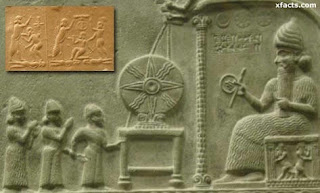
A coworker of mine and I were talking one day about religion and we got on the topic of the 10 Commandments. He said that even I had to agree that all of our laws in America were based upon them, and the reason our laws are based upon them is they came from god.
First, a little background on my coworker. He was a minister at his church, and attending school to become a pastor. He is very devout in his beliefs, and even though he and I disagree on spiritual matters, I respect the hell out of him. He is the type of Christian that is open-minded enough to answer your questions without getting butt-hurt in the process.
Now, back to his statement regarding the 10 Commandments. I asked him what he meant by that. He said that without the 10 Commandments, we would have no authority to determine what good and bad is, and society would be evil and chaotic.
I asked him if he felt that people didn't realize that it was wrong to kill before the supposed divine revelation from god? He said that they couldn't have known it was wrong. I chuckled a little at his reply. He asked what I thought was funny, and I asked him if he remembered why Moses fled from Egypt at the age of 40? He thought for a second, and said it was because he had killed an Egyptian that was beating a slave. I let that sink in a little and then said, was it because he killed someone, or was it because he was going to be punished (put to death himself) for commiting murder?
 Apparently, the Egyptian culture had a series of laws in place regarding morality and civil conduct. Genesis 39-42 talk about Joseph's stay in the Egyptian penal system (BTW, his crime was apparently forcing himself on another man's woman). I'm not sure what the other criminals were incarcerated for, but it would seem like there were laws that required obedience in common practice prior to the Exodus.
Apparently, the Egyptian culture had a series of laws in place regarding morality and civil conduct. Genesis 39-42 talk about Joseph's stay in the Egyptian penal system (BTW, his crime was apparently forcing himself on another man's woman). I'm not sure what the other criminals were incarcerated for, but it would seem like there were laws that required obedience in common practice prior to the Exodus.Such reverence is given to Moses in the bible (both the old and new testaments) and even in the qu'ran. But I find him to be more of an enigma. Let's look at what the bible says about him. He was born a slave and placed in an arc and set adrift on the Nile. The Pharoah's daughter finds him and claims him as her son. He is raised as Egyptian royalty, and is heir to the throne of Egypt. Then, at the age of 40 he kills an Eqyptian who is beating a slave. He then flees to save his own life.
The puzzling part of this to me is the whole 'prince of egypt' thing. If he was heir to be Pharoah, would he really be punished for killing anyone? I would say no, unless the Egyptians had very strict laws.
 Exactly when the Exodus occurred has been up for debate, and probably always will be, but it seems to be a window from about 1200 BCE to 1500 BCE. So, even giving them the benefit of the doubt by using the older date, than means that the Sumerian "Code of Ur-Nammu" predates the commandments by over 600 years. Hell, that means that those laws were being practiced even before the Hebrews were supposedly enslaved. And more to the point, the codes of the Sumerian culture seem to be much less about gods and more about what the consequences are for your actions.
Exactly when the Exodus occurred has been up for debate, and probably always will be, but it seems to be a window from about 1200 BCE to 1500 BCE. So, even giving them the benefit of the doubt by using the older date, than means that the Sumerian "Code of Ur-Nammu" predates the commandments by over 600 years. Hell, that means that those laws were being practiced even before the Hebrews were supposedly enslaved. And more to the point, the codes of the Sumerian culture seem to be much less about gods and more about what the consequences are for your actions.I can't really argue against the statement that our laws today are modeled after the 10 Commandments (at least the "Don't Kill, Don't Steal" ones), but that really isn't the point of my banter there. My point is that those Commandments didn't come from god, but instead from the steady cultural evolution of society itself.
No comments:
Post a Comment